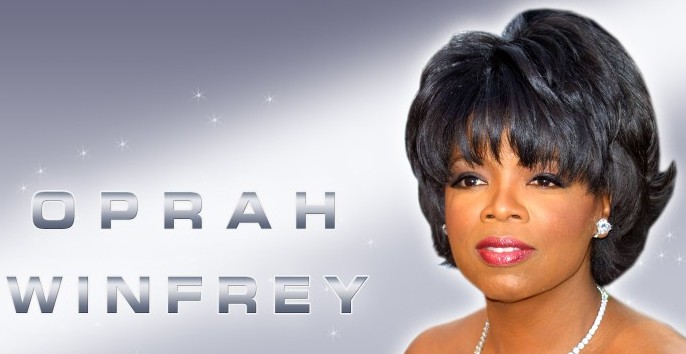It’s a testament to her power, wealth, and ego that, in spite of tepid press and even worse ratings, Oprah Winfrey could produce a two-part special about the creation of her own network.
Oprah Builds A Network, a two-part special (part two airs on Sunday, July 15), was billed by the network as a “candid look” at a network that’s bled money and had a high-profile bomb in its first year, all things Oprah herself has acknowledged. The two-part special aims to do something no one would ever think to do: paint Oprah as something of an underdog. Of course, it’s also a ploy at a ratings boost, much like Oprah’s much-hyped (and much-criticized) two-part interview with the reality television “stars” the Kardashians earlier this year. Ultimately, it’s the latter issue that shines through in the first part, the special never delving into Oprah’s struggles (or any struggles, really) and, in fact, reveals the network for what The A.V. Club’s Sean O’Neal called it almost a year ago: “a hubristic folly.”
In the special’s opening minutes, Oprah recounts how she was unable to focus on OWN’s first year because she was so dedicated to wrapping up the final season of her own daytime talk show (which included a trip to Australia). The documentary uses behind-the-scenes and archived media footage to briefly tell the “story” of OWN’s roll-out and how Oprah set up people around her to make the transition to CEO of the network more comfortable. But in this early part, Oprah stumbles into the issue of why so much of the world seems to be focused on the struggles of the network while also accidentally indicting herself.
She tells of literally sitting at the feet of Lorne Michaels who proceeds to tell her that people will want to see her pay her dues for the new network to succeed. But she does this after off-handedly mentioning how it occurred at a dinner party at the house of another media mogul, David Geffen. Oprah wants to at once portray herself as an everywoman, as someone struggling to succeed and pay her dues, but can’t let go of that power, of her high status, a narcissistic need that feeds into the backlash against her. (This is, after all, a woman who appears on the cover of every issue of her magazine.)
While she surely had to fight many battles early in her career as a black woman in a predominantly white male industry, it’s hard to imagine Oprah, the one-woman empire, as vulnerable. It’s a telling moment: at a point where she can try her best to garner sympathy, her hubris slides in, even subtly, to remind us that we, the viewers, are not like “Oprah,” and it creates a barrier to understanding her point of view. The special is squarely aimed at those who already love Oprah, those who belong to what the rest of the world somewhat derisively refers to as the “Cult of Oprah” and no one else.
To its detriment, the special tends to use a theme-related narrative versus a linear, calendar-related narrative. The special’s scope is extremely limited, skips the network’s development and launch, and is disjointed. From the all-too-brief overview of the network’s birth, the special moves to Oprah’s February 2012 visit to a Georgia town to announce the launch of a dating reality show to display Oprah’s hands-on role in launching new shows on the network. Instead of showing where the idea of this show came from or how it compares to other programs, we’re thrown to the start of production of a show taking place 13 months after some of the most interesting “building” has taken place.
During the visit to Georgia, we catch Oprah pontificating on one of life’s harshest realities: people on the Internet are mean. She even takes a moment to rail against those who tweet negatively towards her.
And then drama is created by a seemingly innocuous tweet in which Oprah begged viewers with Nielsen boxes to check out her network. Like the earlier anecdote, this one, too, sets a bothersome tone for the special: Oprah portrays herself as someone acted upon by outside forces, not being stranded in a quagmire of her own making. She denies any knowledge of the Nielsen rule prohibiting such a request of viewers and admits to being embarrassed by the mistake and apologized.
Still, though it was apparently one of those “candid” moments, it’s another example of the special spending time on seemingly pointless minutiae rather than actual struggles and given the network’s financial and ratings issues, there’s a lot that’s being glossed over. And that’s being extremely understated about it.
There’s some comic relief halfway through by reliving Oprah’s Oscar night appearance on Jimmy Kimmel’s show. Oprah does have a sense of humor about herself, even as she does worry about her image in the context of Kimmel’s proposed skits (more on that in a minute). And the high regard the Kimmel cast – including Kimmel – holds Oprah is clear.
Yet there’s little reaction from Oprah about how she feels about this, about her own reflections of reaching such heights. But it’s important enough to the producers that almost a third of the special is spent on her time visiting the Kimmel show.
While some of Oprah’s thoughts are more candid than the most skeptical observer would have expected, there’s still the nagging suspicion of how controlled her – and the network’s – image is by Oprah herself. Even as she seems to be revealing moments of self-doubt and struggle, there doesn’t seem to be any spontaneity about these instances. Instead, it’s Oprah giving us exactly how much or little of the backstory as she wants.
She gets shape her own story; there’s no one to refute her claims or push her to defend decisions. I mentioned earlier how the special early on felt like it was aimed at those who already adore Oprah and it follows throughout, something, admittedly, to be expected by a self-produced special on her own network. When the off-camera interviewer – who makes only one appearance – asks Oprah if she was worried about “spoofing her own brand” with her Kimmel appearance, Oprah shakes it off and says, “My heart is my brand.” She rolls it out so quickly that it feels like she’s spent half her life practicing it. And yet, while that brand has taken a hit (though not Kimmel’s fault), there’s no indication of that here.
Still, when a special of this sort is advertised and promoted as a “candid look” at behind-the-scenes moments, viewers have a right to expect a full story, especially when that story is of one of the world’s biggest media moguls struggling to launch her own network. So when the resulting special is something of a disjointed puff piece that doesn’t even dig as deep as a Barbara Walters interview, there’s good reason to be disappointed and even more skeptical of how controlling Oprah is of her empire and her image.
This is the same woman who tore apart James Frey after he admitted to fabricating his best-selling memoir and who has pushed countless guests to tears by pushing them on sensitive questions.
Yet she won’t let that same harsh light be shone on her. Not here, anyway. It’s as if she had the same reaction to any suggestions of showing the network’s real struggles as she did to those Twitter haters.
Unless part two intends to delve into those struggling moments (and there are a few indications it might, sort of), there’s little to glean from part one. It’s less a look at the building of the network and more about a few months in the life of a media mogul with maniacal control, glossed to a high sheen. The special is revealing, as advertised, but for all the wrong reasons.
Stray observations
During the Kimmel segment, Oprah drops a huge humblebrag when she talks about how people perceive her as “noble and earnest” but not really having a sense of humor.
The phrase “building a network” is repeated so many times, it’s easy to believe that every single moment of the special was carefully choreographed.
One day, there will be a great documentary or book made about the real behind-the-scenes struggles and career trajectory of Oprah. This is nowhere near that.
A teaser for next week’s part two seems to indicate that there will be a look at struggles for the network, including layoffs and the cancellation of Rosie O’Donnell’s show. It’ll probably be more drama-filled than this part but I’m not holding my breath for things to get too deep.
I’d still happily watch a non-Harpo-produced documentary about the complete creation of the network. There’s a lot to work with here given Oprah’s stature and personality and how networks do initially struggle to get a foothold. There could be a lot to learn and a lot of interesting insights to take away but only if Oprah and her people weren’t allowed to control it.
[adrotate banner=”33″]


▬▬▬▬▬▬▬▬▬▬▬ஜ۩۞۩ஜ▬▬▬▬▬▬▬▬▬▬▬▬▬Thanks for Sharing the video and enjoyed whniactg. I have shared on my new website called Qtellnet.com ( Social Network )and also posted on my facebook page called Qtellwebdesign Webdesign IrelandYou can connect with facebook to Qtellnet and start sharing todayHave a nice dayMichael▬▬▬▬▬▬▬▬▬▬▬ஜ۩۞۩ஜ▬▬▬▬▬▬▬▬▬▬▬▬▬